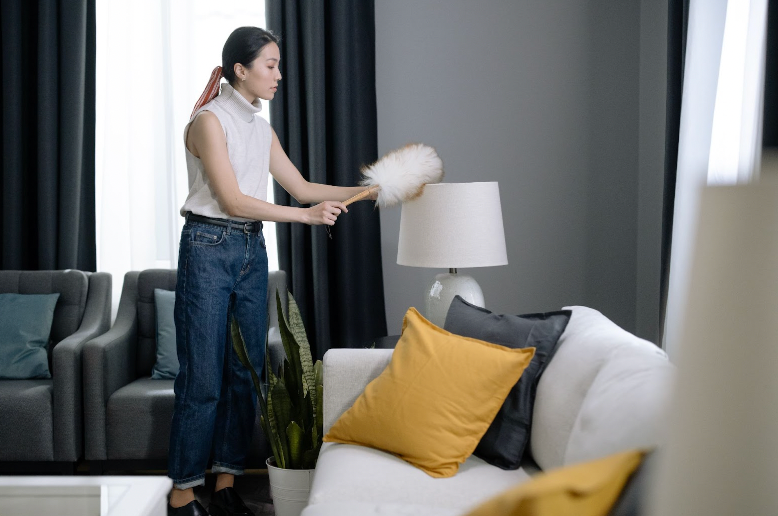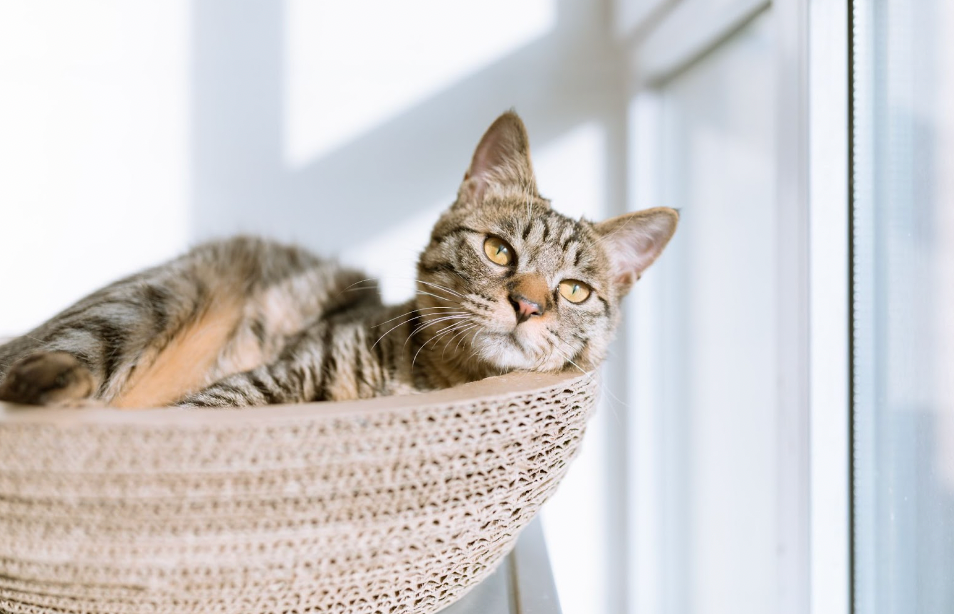
Since the pandemic, indoor air quality has become increasingly important as we spend more time inside. The average American spends 87% of their time indoors. So you would assume indoor air pollution and health would be a topic we would hear about more frequently, but unfortunately, that's not the case.
The truth is indoor pollution can be a severe threat. It can cause health issues such as asthma attacks, respiratory infections, allergies, and cancer. According to the WHO, poor indoor air quality caused an estimated 3.2 million deaths in 2020, including about 237,000 deaths in children under 5.
The NCBI states that a pet's airway disease may worsen if the air quality isn't good. In addition, our beloved furry friends are not safe from these effects either. So if you improve indoor air quality in your house, the entire family will benefit.
Fixing indoor air quality is one of the essential things we can do for our pets' health and well-being. Unfortunately, many organic compounds in household air can harm our animals, including carbon monoxide and other toxins. However, there are a few simple ways to improve your home's air quality to keep your family and pet safe and healthy.
Why Is Air Quality Important For Your Pets?

Air quality is vital for your pets, as they are exposed to the same levels of pollutants and toxins as we are. But what is the leading cause of air pollution inside? The main culprits are mold spores, pet dander, dust mites, tobacco smoke, and cooking fumes.
Poor air quality can lead to increased respiratory issues and allergies, which can, in turn, cause a loss of energy and focus. To ensure that you are protecting your pets from unhealthy air, start using air quality monitors at home and take steps to improve them when necessary.
Improving The Indoor Quality Of Air For Pets
Poor indoor air quality has become an increasing topic of discussion in recent years. If left unchecked, indoor air pollution can lead to various adverse health effects, from respiratory problems to headaches and dizziness.
Every kind of pet has different needs. Some pets require a higher level of care than others, so it is best to consult with a veterinarian before taking action.
How do we fix the quality of indoor air for our pets? The Public Health Insider gives general tips:
Take your shoes off inside.
Taking off your shoes inside keeps dirt and other things from getting tracked through the house and making the air dirty.
Dust and mop frequently.
Cleaning is essential to maintaining good indoor air quality. This includes cleaning carpets, furniture, curtains, blinds, and anything else that might trap allergens or irritants.
You should also regularly clean your dog's bedding, especially if they sleep in the bedroom. A vacuum cleaner is ideal for this task. If you have cats, clean their litter box daily by spraying it with water and vinegar.
Refrain from lighting scented candles indoors.
If you must, choose organic candles like beeswax.
Avoid Smoking Indoors
Secondhand smoke is harmful to children's and pet's health and increases the risk of lung cancer.
Ventilation
When you cook, use a kitchen exhaust fan or open a window for airflow.
Air Pollutants
Air is one of the most critical elements on earth, essential for life and vital for the health of people and pets. However, air can also contain hazardous pollutants that pose a severe health risk. Let's talk about indoor and outdoor air pollutants and their potential sources.
Indoor Air Pollutants
Indoor air pollutants include indoor mold, chemical fumes from various household products such as dryers, cigarette smoke, kitchen fans, laundry activities, and more.
These indoor pollutants have been linked to various adverse health effects, including respiratory diseases such as asthma attacks, headaches, and fatigue.
Outdoor Air Pollutants
Outdoor air pollution consists mainly of vehicle exhaust, industrial effluent, microscopic particulate matter, and gases like carbon monoxide. These outdoor air pollutants have been shown to cause adverse effects on both respiratory and cardiovascular systems and increase the risk of chronic diseases, lung cancer, and heart disease.
So, what is the most helpful way to improve indoor air quality?
Change AC filters
While air conditioners cycle through all that cool, clean, filtered, fresh, and pure outside ambient atmosphere, they also remove some common outdoor pollution from the environment.
Indoor air pollution occurs when chemicals and particles enter the home through the air conditioning system, heating system, fireplace, or even through cracks around windows and doors. So, ensure you are changing your AC filters regularly.
Use Air filters

Air filters are an essential tool for indoor air quality. They work by trapping hazardous particles such as dust particles and allergens that, when inhaled, can cause respiratory issues for people with allergies. Several indoor air filters are available, including HEPA, carbon, and wet-washed filters. To capture particles from the surrounding air, each type of air filter operates slightly differently.
Per Country Living's tips, the best air purifiers catch and eliminate almost all air pollutants. This is accomplished by sucking in stale air, passing it through a filtration system, and releasing the purified air back into the area.
Do you have a limited budget? No problem. As a more budget-friendly option, you may create a DIY box fan filter to prevent some types of air pollution by 90%. For the DIY tutorial, continue reading this article.
Check Air Ducts
Air ducts are crucial in ensuring the air inside is clean and healthy. They provide a pathway for conditioned air to circulate within your home or building, helping to keep indoor temperatures comfortable and prevent the spread of pollen, dust, and other unwanted, harmful particles. But to work properly, air ducts must be kept clean and well-maintained.
Tips for cleaning air ducts include:
- Vacuuming the ducts before each use.
- Remove dust and grime using a wet cloth.
- Wash them regularly with soap and water.
- Avoid using harsh cleaning supplies.
- Don't forget to check vents and registers for any blockages or damage.
Use Cooking Vents
It's crucial to have effective ventilation in the kitchen. Kitchen vents assist in removing gases and smell from the kitchen, ensuring that they don't hang around for long. Without proper ventilation, these fumes can cause a number of health problems, as well as foul odors in your home.
Try these tips to make sure your kitchen has effective ventilation:
- Use a vent hood over your stovetop. This will allow hot air to escape while keeping the room cooler.
- Keep your oven door closed during baking.
- Make sure no smoke or fire is coming from the burner.
- Turn off the gas stove if you can.
- Open windows if necessary.
- Consider installing a dehumidifier.
Rugs And Carpets
Rugs and carpets are two popular floor coverings that add comfort, style, and functionality to many homes and businesses. Rugs are typically smaller in size, as they cover just a limited space on the floor, such as by a fireplace or next to a bed. On the other hand, carpets tend to be much larger, covering entire or sections of rooms.
We all love nice and comfy rugs and carpets, especially our furry friends, who love napping on them. However, they require regular upkeep to prevent them from becoming a source of poor air quality.
Control Humidity
A humid climate is an essential factor that affects temperature and comfort, as it can decrease dryness in indoor spaces.
When it comes to indoor air quality, humidity levels should be maintained between 30%-60%. Too high humidity levels can result in condensation inside your living space, which can cause mold growth and mildew. On the other hand, bacteria and fungi can also grow when humidity levels are too low.
Indoor Plants For Fresh Air
One of the most important aspects of good health is having clean, fresh air. You can add houseplants to improve the quality of the air we breathe in our living space on a daily basis. Some of our favorites are:
- Snake plants
- Basil
- Bamboo
- Bay Laurel
- Catnip
How To Identify If Your Pet Is Suffering From Poor Air Quality
Pet owners desire happy, healthy pets. A healthy lifestyle can help attain this goal. There are a few ways to tell if your pet is sick because of bad air quality. Find out below:
Sign #1: Excessive Coughing
One of the most common signs that your pet is experiencing poor air quality is excessive coughing or sneezing. This can signify that your pet's respiratory system responds to hazardous pollutants, irritants, or allergens in the air. The worst-case scenario is that they could lead to pneumonia.
Sign #2: Excessive Fatigue or Sluggishness
Another common indicator of poor air quality for pets is excessive fatigue or sluggishness. If you notice that your pet seems more sluggish than usual, this may be due to elevated carbon dioxide levels or other negative effects of poor air quality. Pay attention and make any changes needed to improve its overall well-being.
Sign #3: Loss Of Appetite
Loss of appetite can be an indication that your pet is experiencing problems with the quality of its indoor environment. If you notice that your pet isn't eating as much as usual, it may be worth investigating any possible links between their diet and the quality of their living space. Better be safe than sorry!
Frequently Asked Questions:
What Are Air Ducts?
- Your house's heating and cooling system distributes warm and cool indoor temperatures through its vents.
What are the benefits of duct cleaning?
- If you want to ensure that your ducts are circulating clean, fresh, and have healthy airflow, hire a professional to help you.
What Are the Indoor Air Pollution Sources?
- Many indoor air pollutants come from the kitchen, making kitchen cleaning and ventilation improvement necessary.
What Other Appliances Should I Check?
- Inspect and maintain your vacuum, laundry activities, and kitchen vents regularly.
What Happens If You Don't Change Your AC Filter?
- Eventually, their air filters fill up and then stop doing their job.
Final Thoughts
To live a healthy life, you need to breathe clean air. However, our pets depend on us to give them the same chances we do. By following the tips above, you'll be able to keep your pet's air quality at optimal levels. Start making changes to your home today!





